Perspectives on the Synod
In March 2020, Pope Francis announced a major event in the life of the church: the Synod on Synodality. Built around the themes of communion, participation and mission, the pope called this Synod—the 16th such meeting since its reintroduction by Pope St. Paul VI in 1965—“what the Lord expects from the church of the third millennium.” It is a “walk together,” a way of proceeding driven by the Holy Spirit and implemented by the People of God.
In 2023, more than 360 people from around the world—bishops and cardinals, religious sisters and clergy, members of the laity and Outreach’s own James Martin, S.J.—gathered in Rome to discern where the Holy Spirit may lead the Catholic Church. The October meeting marked the opening of the Synod’s “universal phase,” which was preceded by listening sessions and opinion gathering at the diocesan and continental levels. The Synod is set to conclude with a final gathering next year.
Are you curious about the perspectives of Synod attendees? Do you wonder what this global gathering will mean for the future of the church? Outreach has you covered.
Check back here as we feature analysis and commentary on the Synod from participants, theologians, LGBTQ people and those who minister with them.
Images from the Synod
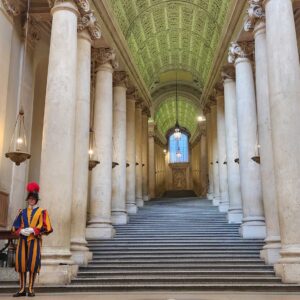













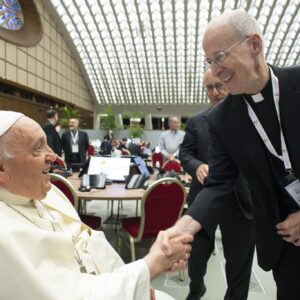
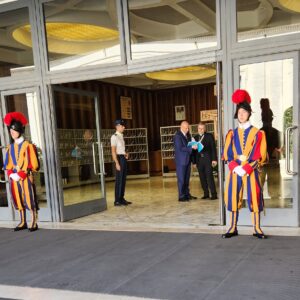



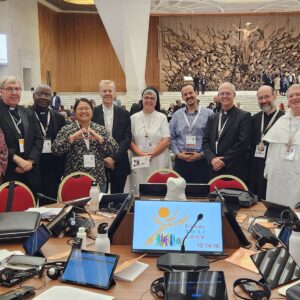

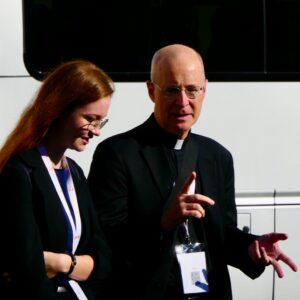
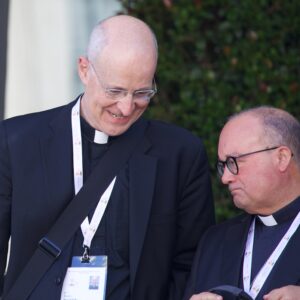
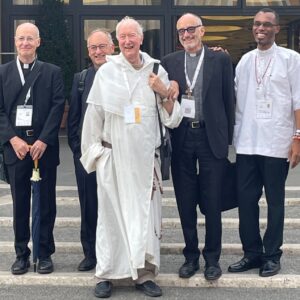
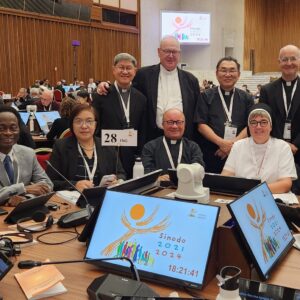
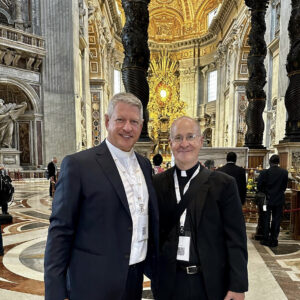
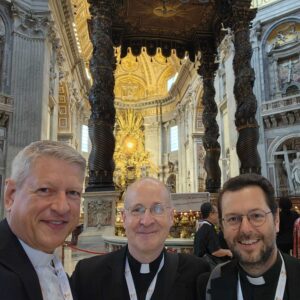


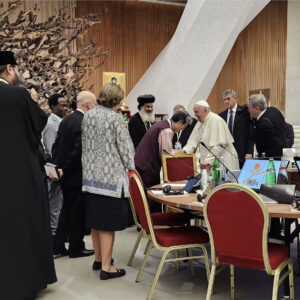
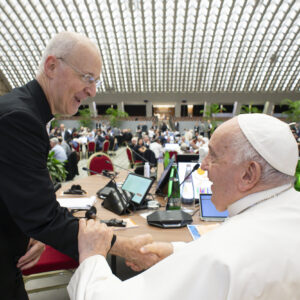
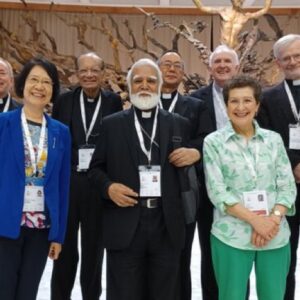
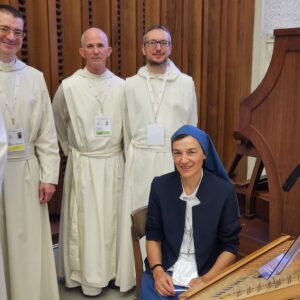
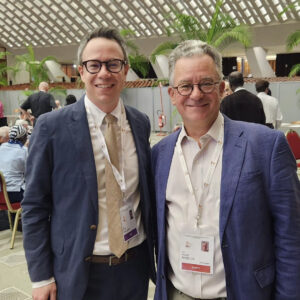
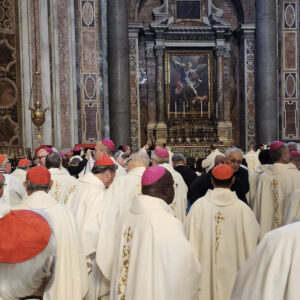
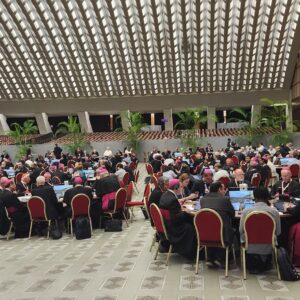
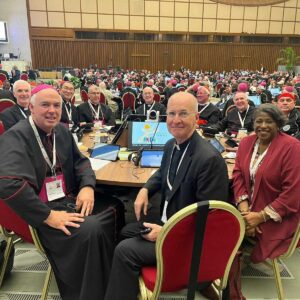
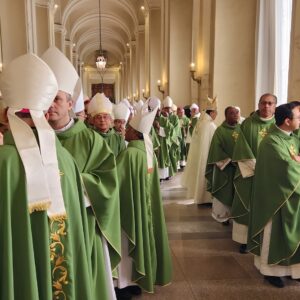
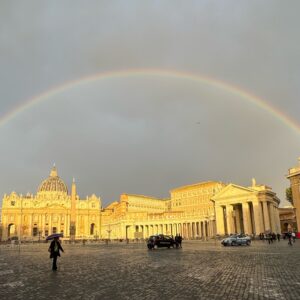
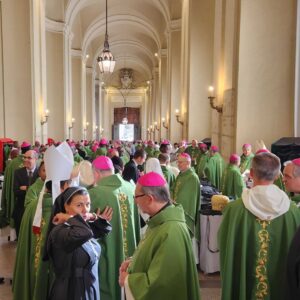








































All photos courtesy of James Martin, S.J., unless otherwise stated.
James F. Keenan, S.J.: The Synod should embrace the “radically inclusive friendship” of the LGBTQ community
So as to propose a bridge between the church and its LGBTQ community, I propose raising up a value that is paramount within the gay community. I call it radically inclusive friendship.
Lisa Sowle Cahill: LGBTQ People, the Synod and Blessing Same-Sex Couples
From almost the beginning of his pontificate, Pope Francis has signaled that LGBTQ people should not be excluded from the circle of Catholic faith and practice.
How to address questions of “identity and sexuality” raised by the Synod
We may quarrel over how to interpret Scripture or how to understand the church’s teaching on human sexuality, but we cannot deny the reality of same-sex relationships as integral to the meaning of the church as the People of God.
Five commitments the Synod made to the church and what they mean for LGBTQ Catholics
Two years of global listening brought forward the joys and sorrows of LGBTQ Catholics, so we need to be empathetic towards those who say the Synod report was a letdown.
The Synod emphasized the lived experience of the faithful. This must include LGBTQ people.
Genuine reciprocal listening, dialogue and communal discernment would include a diversity of perspectives and make space for the LGBTQ community.
As a gay Protestant pastor, I have mixed reactions to the Synod report
While I understand the challenge for the Synod to explicitly affirm LGBTQ people, these two references feel like too little at best and patronizing at worst.
Synod report reveals compromise and disagreement on gender and sexuality
By providing a pathway to deeper discernment, and not simply urging consensus, the report signals that the church’s cooperation with the Holy Spirit is ongoing
Watch: Father James Martin on LGBTQ people and his optimistic view of the Synod process
In July, Pope Francis personally appointed Outreach editor James Martin, S.J., to the Synod on Synodality, a two-part worldwide gathering in Rome attended by more than 360 prelates, clergy members and lay people.
Father James Martin: I experienced the Synod as a spiritual journey
We had our differences, and maybe some of the delegates would never agree with me on LGBTQ issues, if they even used that term. That’s okay. As we were told often about the Council of Jerusalem, in the Acts of the Apostles, there was a lot of disagreement then, too.
A queer Catholic and his Presbyterian friend journey to Rome for the Synod
It was a beautifully liberating moment, one of the first times in my life where I felt that pieces of myself—my queerness and my Catholicism—became truly integrated. I could be both/and instead of either/or in such a public way.
Father James Martin: My experience at the Synod
To my mind, that was the most important thing that occurred at the synod: Friendships were built across boundaries, within the boundary of our love for Christ, whose love knows no boundaries.
The first Synod report addresses many topics. So where are LGBTQ people?
By multiple accounts, LGBTQ people—at least through their stories and struggles—were present in the Synod hall. But they are noticeably absent from this document.
Why I’m happy to not know everything about the Synod
I hope that this privacy has enabled richer conversations freed from the limits of instantaneous, public debate. This shows just how different this assembly is from so many other forms of shared decision-making in our world.
Will the Synod on Synodality really bring significant change for LGBTQ Catholics?
The hopeful “yes” to my question about significant change begins with the simple fact that the conversation is happening. At last, after decades of Catholics advocating for an open dialogue on issues of gender and sexuality, that dialogue has arrived, albeit in nascent form.
Pope Francis shows support to LGBTQ Catholic groups as Synod meets
These papal meetings come amid widespread speculation and significant interest about discussions between Synod delegates on LGBTQ topics.